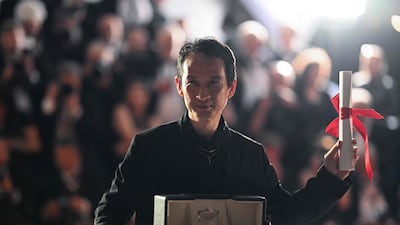“I have the feeling that I really made a French movie,” says filmmaker Tran Anh Hung, talking about his new work The Pot au Feu. The Vietnamese-born director moved to France with his family when he was 12, but this movie – the seventh of his decorated career – is certainly the closest to his adopted country.
A “foodie” movie, starring Juliette Binoche and Benoit Magimel, it’s a delicious concoction that feels like a natural successor to Babette’s Feast and the Binoche-starring Chocolat.
Adapted from the 1924 novel La Vie et la passion de Dodin-Bouffant, Gourmet (The Passionate Epicure) by Marcel Rouff, it tells the 19th-century story of a slow-boiling romance between a cook Eugenie (Binoche) and her gastronomic mentor Dodin (Magimel). Since the film first screened at the Cannes Film Festival a week ago, it has already been sold widely around the world and, crucially, won Anh Hung the festival’s coveted Best Director prize.
A feast for the eyes, it is a delightful watch, destined to have audiences foolish enough to enter the cinema on an empty stomach salivating over the film’s beautiful array of dishes that Eugenie and Dodin cook so sensually. While the story is inspired by the famous French gastronome Jean Anthelme Brillat-Savarin, the production employed one of the great culinary artists of the modern age, Pierre Gagnaire, the serial Michelin-lauded chef, to work as an advisor on the film.

“We did the menu together and he cooked for me,” explains Anh Hung. Despite Gagnaire’s brilliance, the director soon realised that even the greatest chefs are not infallible. “When Pierre cooked for me, I said: ‘Okay, now do an omelette’ … he missed it twice before getting it right the third time.” Anh Hung, 60, also worked with a gastronomic historian, who informed him of exactly the right wines to complement the food on screen – wines that all tell a story in the film.
When it came to shooting the meals, Anh Hung refused to use a food stylist – those who are experienced at making dishes look delectable on screen. “A food stylist is for TV commercials, because they are more focused on the beauty of the product," he says. "In this movie, it was not my concern. I wanted to have food in action somehow. We see them touching the real meat and vegetables. What was important for me is to show men and women at work.”
The cooking scenes, of which there are many, are beautifully shot by cinematographer Jonathan Ricquebourg, with Ahn Hung choreographing exquisitely. He refuses to see it as poetic, though. “I’m not looking for the poetry," he says. "I prefer having another language with my crew. This is my car chase. Like in an action movie. It’s my car chase scene. We need a lot of energy for that.”
Intriguingly, the film reunites Binoche with her former off-screen partner Magimel (together, they have a 23-year-old daughter, Hana). They last starred together in 1999’s Children of the Century and it was Anh Hung that suggested to Binoche that the Frenchman might be ideal casting as Dodin. “At first she thought that Benoit will never accept because of their [history],” says the director. “But then when I go to him, he read the script and he said: ‘Okay, I’m in.’ And he was so happy. And then I tell her, and she said, ‘Oh really? I’m surprised!’”

Thankfully, they got on well during the shoot. “The first day on the set I was: ‘OK, I have my movie!’” says a relieved Ahn Hung. When it came to tutoring his actors, he was very specific.
“The only thing that I tell them is that I don’t want things to be natural, because I don’t care. A movie is not life. Life is experience. Movie is expression. So please, when you talk, slow down. And before saying a word taste it. Because while you are tasting your line, the audience will look at your lips. It makes it precious. So please slow down. Take your time before saying things.”
It’s the sort of comment that underlines the kinship between cooking and moviemaking, the idea of savouring and simmering ingredients until they’re just right. “I remember what moved me the most when I was young is the kitchen of my mother,” recalls Ahn Hung, who was born in the city of My Tho in South Vietnam.
“I’d always wait for my mother to come back to the market, to see what she bought. And then guessing what we will have for lunch or for dinner. So it’s a place where I’d spend a lot of time.”
After studying philosophy at university, and later photography, Anh Hung took his first film The Scent of Green Papaya to Cannes in 1993. The film won the Camera d’Or, for Best Debut, and received an Oscar nomination for Best International Feature.
His second film was equally acclaimed, 1995’s Cyclo, which follows people living in Saigon. It won the Golden Lion in Venice. He later returned to the Italian festival with the Japanese-set Norwegian Wood, an adaptation of the Haruki Murakami novel, which was scored by Radiohead’s Jonny Greenwood.
Yet The Pot au Feu is liable to be the biggest film of his career, given its appeal to audiences across the globe. It’s no major stretch to see this film following The Scent of Green Papaya towards an Oscar nod in nine months’ time. Already, though, Anh Hung is thinking beyond this, with his publicity duties a crucial part of the jigsaw.
“All the interviews, I really enjoy," he adds. "In the way that you are going to get me tired of my movie. I have to talk about it. So it allows me to move to my next project.” So what will that be? “I don’t want to say because each time I’m saying it, then it sounds crazy.”
No sense in spoiling the broth just yet.

